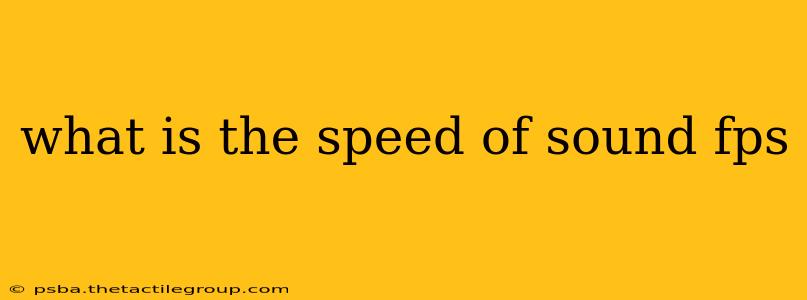What is the Speed of Sound in FPS (Frames Per Second)?
The question "What is the speed of sound in FPS?" is a bit of a trick question, playing on the dual meaning of "FPS." While FPS commonly refers to frames per second in video games and filmmaking, it's not a unit of measurement for speed. The speed of sound is typically measured in meters per second (m/s), kilometers per hour (km/h), or feet per second (ft/s).
To understand why this question doesn't directly translate, let's break down the concepts:
1. Speed of Sound:
The speed of sound is the distance sound travels through a medium (like air, water, or a solid) in a given amount of time. This speed isn't constant; it depends on factors like:
- Temperature: Sound travels faster in warmer air.
- Medium: Sound travels faster in denser mediums (like water) than in less dense ones (like air).
- Humidity: Humidity slightly affects the speed of sound.
At sea level and 20°C (68°F), the speed of sound in air is approximately:
- 343 meters per second (m/s)
- 767 miles per hour (mph)
- 1125 feet per second (ft/s)
2. Frames Per Second (FPS):
FPS, in the context of video games and filmmaking, refers to the number of individual still images (frames) displayed per second to create the illusion of motion. A higher FPS generally results in smoother, more realistic-looking movement. It's a measure of image refresh rate, not of speed in the physical world.
Connecting the Concepts (Indirectly):
While you can't directly measure the speed of sound in FPS, you can relate them indirectly in certain contexts, such as:
-
Sonar/Echolocation Simulations: In video games or simulations depicting sonar or echolocation, the speed of sound might influence how quickly a visual representation of the sound wave travels across the screen. The rate at which this visual representation updates could be measured in FPS, but that doesn't represent the actual speed of sound.
-
Visualizing Sound Waves: In educational animations or simulations, the speed at which a visual representation of a sound wave propagates might be tied to the real-world speed of sound, even if the animation itself runs at a certain FPS. Again, the FPS of the animation is independent of the actual speed of sound.
In essence, while FPS and the speed of sound aren't directly convertible, they can be conceptually linked within specific simulations or visualizations. However, the speed of sound is best expressed using standard units of speed like m/s, km/h, or ft/s.

